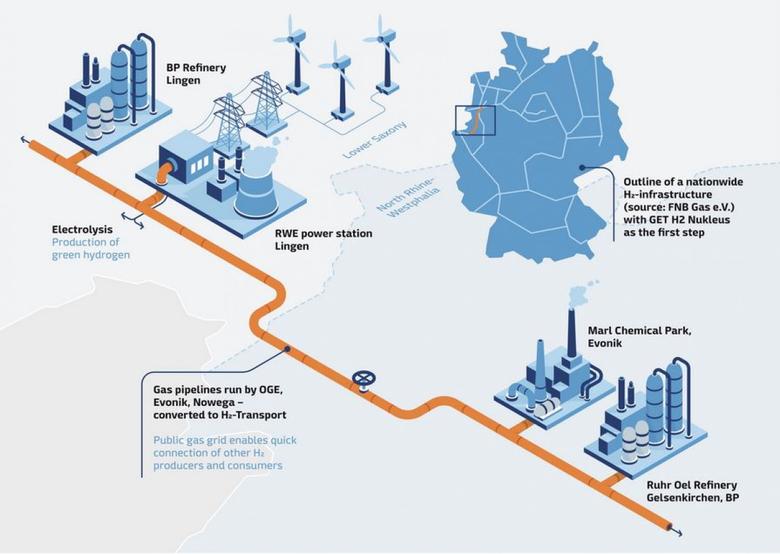
GERMANY'S HYDROGEN STRATEGY

PE - 11 June 2020 - The German government formally adopted its long-anticipated national hydrogen strategy yesterday, paving the way for the country to take a leading global role in developing a hydrogen economy, and green hydrogen in particular.
The aim of the strategy is to decarbonise Germany's substantial industrial sector, including steel and chemicals, as well as transportation. The federal cabinet has also appointed members to a newly formed National Hydrogen Council, which will implement and further develop the strategy.
The strategy also has the aim of underpinning Germany's economic recovery from the Covid-19 crisis. "We are paving the way for Germany to become the world leader in the field of hydrogen technologies," says the federal minister for economic affairs and energy, Peter Altmaier. "We must therefore harness the potential for economic output, employment and the climate, and do this now."
Energy transition
The federal government has long identified hydrogen as a key component of its energy transition. Internal discussion centred on whether to heavily favour green hydrogen (derived from renewable energy-powered electrolysis) or allow the more controversial creation of blue hydrogen (derived from reforming methane and carbon capture and storage). It seems that those more focused on purely environmental considerations emerged victorious.
"Green hydrogen gives us an opportunity to better mitigate climate change in areas where there were no solutions available before, for instance in the steel industry or aviation. This will work because the strategy focuses on promoting green hydrogen," says Svenja Schulze, federal minister for the environment, nature conservation and nuclear safety. "Only hydrogen that is based on 100pc renewable energy is good for the climate."
Germany will continue to invest in research and innovation for the production, storage, transport, distribution and application of green hydrogen. A further €310mn will be made available for the period to 2023.
The announcement was greeted with enthusiasm by Juergen Wollschlaeger, CEO and managing director at Heide Refinery in northern Germany, which is developing a green hydrogen project that is set to become the country's largest.
"The emphasis on green hydrogen is a vital strength of Germany's hydrogen strategy and we believe this holds the key to truly kickstarting the hydrogen economy and achieving sustainable hydrogen production long term," says Wollschlaeger.
"Green hydrogen has the ability to decarbonise some of the hardest to abate sectors–including aviation, chemicals, cement and more—potentially supercharging Germany's climate change mitigation efforts."
Heide Refinery plans to establish a 700MW electrolysis unit by 2030 in its Westkuste 100 project. "This could contribute up to 15pc of Germany's planned electrolysis capacity within this timeframe, significantly contributing to the vision of a cleaner future, which we are thrilled to be part of," he added.
National Hydrogen Strategy goals:
- Establish hydrogen technologies as core elements of the energy transition in order to decarbonise production processes with the help of renewable energies
- Create the regulatory requirements for the market ramp-up of hydrogen technologies
- Strengthen German companies and their competitiveness by promoting research and development and technology exports related to innovative hydrogen technologies
- Secure and shape the future national supply of CO2-free hydrogen and its secondary products
-----








